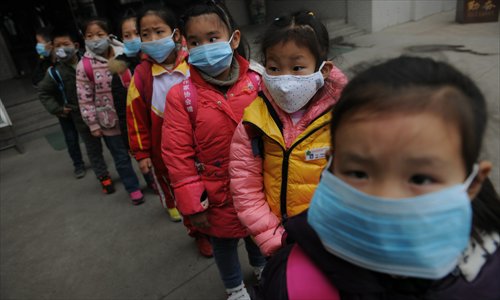Parents demand air purifiers be installed in schools, not all successful

Pupils wearing face masks to shield themselves from air pollution arrive at their school amidst heavy smog in Jinan, East China's Shandong Province on Thursday. Photo: IC
Parents beset by hazardous smog in cities such as Beijing and Tianjin are calling for air purifiers to be installed in classrooms as many cannot take time off work to look after their children when schools close due to pollution.
Beijing has issued air pollution red alerts twice this December. Primary schools, secondary schools and kindergartens were all shut down during the alerts, and some schools suspended classes on a smog-choked Christmas Day following suggestions from the Beijing Municipal Commission of Education.
Many schools have already installed air purifiers, while others are still waiting for official approval from the authorities despite the fact that parents are eager to buy purifiers themselves.
Parents' call
Many parents reached by the Global Times said they have tried to or already bought purifiers for their children's classrooms.
A father, surnamed Jiang, whose child is studying at the Primary School Attached to Peking University, told the Global Times that parents in his child's class paid 200 yuan ($30) each to buy two purifiers after Beijing issued its first smog red alert.
Wu, father of a 4-year-old girl who attends a kindergarten in Chaoyang district in Beijing, told the Global Times that his daughter's class is not so lucky, because the kindergarten refused the parents' offer to buy purifiers for the class, as the local educational authority may collect the purifiers to redistribute them to all the area's schools.
Beijing Huijia Private School has set up four air-supported stadium roofs so students can still have PE class on smoggy days.
Air purifiers are not on government purchase lists in many cities, which means many local authorities cannot spend their budget on purifiers, a newspaper affiliated to the Ministry of Education reported Wednesday.
Air purifiers are not affordable for every school, and parents might differ on which kind of purifier to purchase and where to place the machine, added the report.
Some parents have attempted to crowd-fund air purifiers for their children's schools. but these attempts have usually been refused by schools and teachers, saying they need approval from the education authorities to use purifiers.
Pei Sheng, headmaster of a primary school in Shanghai told thepaper.cn that it's hard to reach a consensus among parents and claimed that an air purifier won't make much difference anyway.
A teacher told the China Youth Daily that purifiers will bring safety concerns and parents cannot buy and use them in classrooms.
Safety concerns
The Beijing education authorities have been working with environmental experts, research institutions and businesses on the feasibility of installing air purifiers in schools since 2014, an unnamed official with the commission told the Beijing News on Saturday.
However, it is not clear whether or not installing purifiers would have side effects that could damage children's health, said the official.
Regular air filters might cause the concentration of carbon dioxide in a classroom to rise, Deng Gaofeng, head of the low carbon-building study office with the China Academy of Building Research, told news outlet china.org.cn on December 21.
"Take the classroom we tested for instance. If we keep windows and doors closed during classes, the concentrations of CO2 in the classroom will double from 1,000 parts-per-million (PPM) to some 2,000 PPM, while according to safety standards, the highest index should not be more than 1,500 PPM," said Deng.
However, the density of CO2 won't be a problem unless the classroom was completely sealed, said Liu Youning, a professor of epidemiology and respiratory medicine at the Chinese PLA General Hospital, adding that fresh air systems can fix the problem.
"Without standard guidance from local authorities, the brand of the purifier, installation, and even the security of the devices can all be issues," Liu Liangcheng, vice-principal of Beijing's Taipinglu Primary School, told china.org.cn on December 21.
One thing is clear, the younger that children are, the more vulnerable they are to air pollution, and protections should be implemented not only on severely polluted days but also on the more lightly polluted days which are very common in many cities, Liu Youning told the Global Times.
Newspaper headline: Air that fails the test